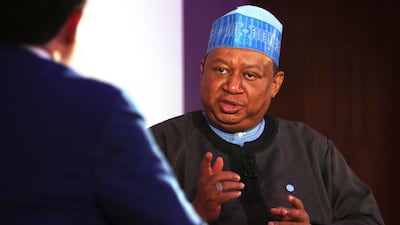An escalation in US rhetoric in the ongoing trade war with China as well as falling Iranian exports will have an impact on supply and demand, with Opec collectively acting to balance oil markets, the group’s secretary general said yesterday. on Tuesday.
"Trade is a major quantum in the overall global economic equation and whatever affects the free flow of trade will ultimately impact growth and will have an impact on oil demand and also on the GDP," Mohammed Barkindo told a conference of energy traders in Fujairah, organised by Gulf Intelligence.
Oil prices have recovered from a three-year slump, rising to around $80 per barrel earlier this month, as exports from Iran, Opec's third-largest producer, began to fall due to the onset of US sanctions against the country. The White House has set November 14 as the deadline for countries to stop importing Iranian crude.
The exporters’ group in June began to revise an earlier pact to hold back around 1.8 million barrels per day from the market to boost prices. With Brent averaging around $72 for much of the year, Opec, led by Saudi Arabia, added 377,000 bpd back to the market since the second quarter of the year.
However, with importers cutting back supplies from Iran, oil markets remain concerned about a possible supply squeeze and higher prices that could trigger production from independent North American shale producers.
_______
Read more:
Oil production at record but IEA says prices likely to rise
Oil trades below $70 as traders assess supply shortage
________
Opec will act collectively to reinforce market balance should the Iran sanctions lead to a supply shock, Mr Barkindo said.
“We’re always acting and in the summer of 2014 we learnt our lessons,” he said.
"We have to continue to be ahead of the curve on all issues and if need be, also take collective action. It is not the responsibility of one or two producers to take decisions on behalf of all producers,” he added.
He stressed that Iran, as a founding member of Opec, would see its concerns addressed adequately by the exporters' group.
The group’s technical committee is monitoring and analysing the current dynamics of the oil market, which will be taken up at Opec’s upcoming sub-committee meeting at the Algerian capital on September 24, he said.
Opec will also press ahead during the meeting to institutionalise the working relationship with sovereign producers outside the group led by Russia.
The National reported in February that the 25 Opec and non-Opec producers undertaking supply corrections will evolve into a super-group by the end of the year.
The charter to formalise the relationship will be agreed to and signed during Opec’s annual meeting in Vienna in December, said Mr Barkindo.


